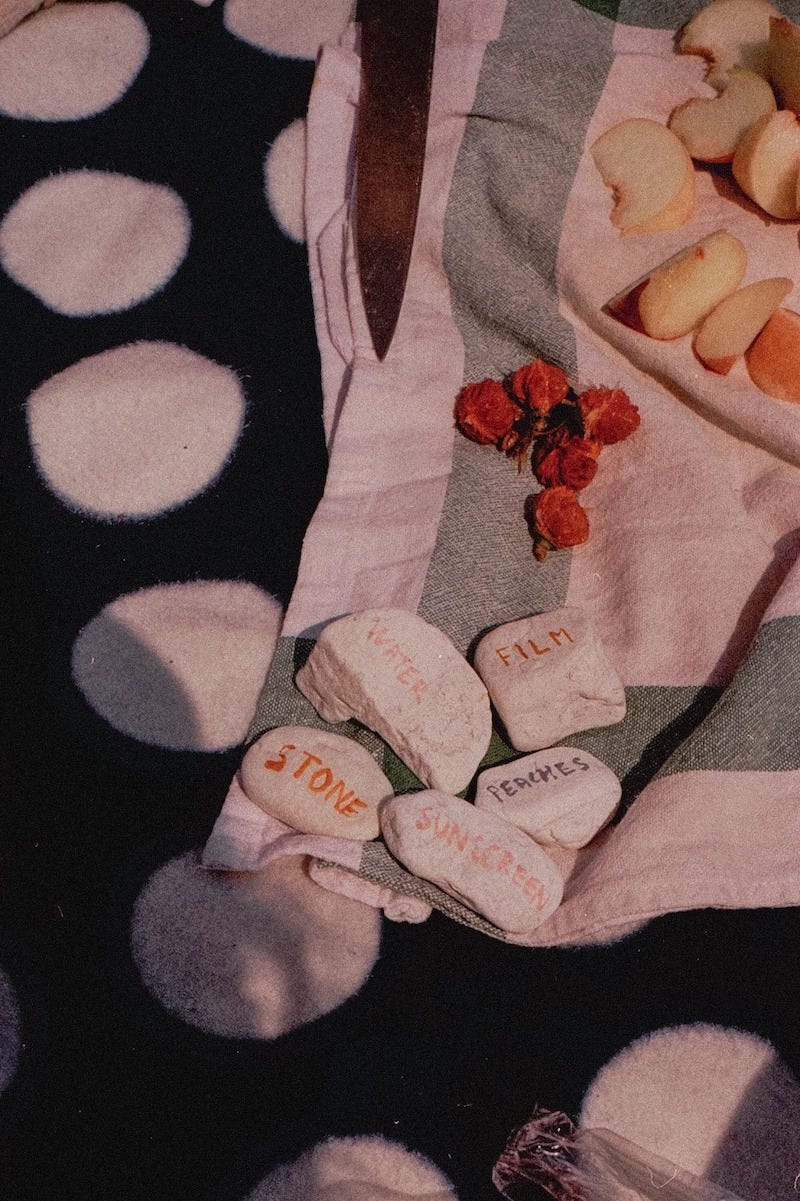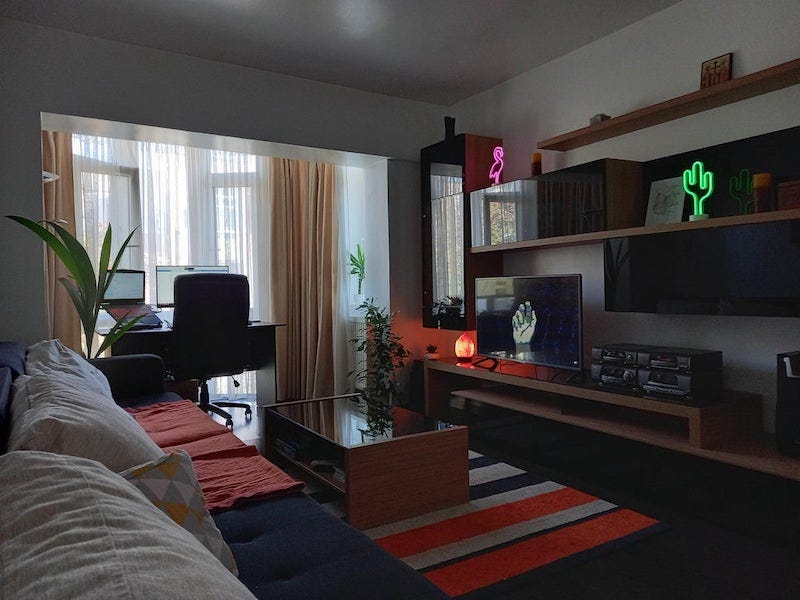You'll Dream of a Big Snake
You'll Be Frightened. Hold Onto It. With Both Hands.
Another Sunday, Another Naive Weekly - Observations From The Internet Wilderness.

I’m writing these words sitting in my couch with Uno sleeping in my lap. On my right side is my laptop, on my left side is my notebook. It is Saturday evening, around 10pm. In my notebook I have written a few pages with words from Haruki Murakami’s After the Quake. It is the only book I’ve finished since Uno was born one month ago.
My plan was to use Murakami’s thoughts to reflect on how we communicate online with messages, mails, and memes. Since I am tired, I will instead let you make those reflections yourself. It also seems fitting giving the actual words and the answer Johannes provide to the question about what emotions are lost online.
So without further ado I’ll finish this beginning with the words of Murakami.
“Please, doctor. Don’t tell me any more. You should have your dream, as the old woman told you to. I understand how you feel, but if you put those feelings into words they will turn into lies.
Have your dream, doctor. What you need now more than anything is discipline. Cast off mere words. Words turn into stones.”
— p. 78
With love,
Kristoffer
VISUALLY DISTURBING

READER INTERVIEW
Johannes Klingebiel works at Süddeutsche Zeitung. His newsletter on media innovation is so good that I decided to polish up my school German to read along. If that is one step too far for you, his Are.na is tendered with the same care and his Twitter with the same relevance as his excellent newsletter.
K: Who can write the future?
Johannes: Lately, I have been reading Benjamin Bratton‘s “The New Normal” and there‘s one quote that stuck with me: „2050 is not the future. We are designing 2050 right now, with every little and large system we use or abuse.“ In that sense, the answer is: everyone does write the future, even if we might not be aware of it. Not necessarily in the form of big techno-utopian futures filled with flying cars and spaceships, but the smaller more personal futures. There‘s so much space we can shape and influence. The bigger question in my opinion should be: who do we decide to write along with?
K: Where do you go fishing for different feeds?
Johannes: One thing I like is digging through other people‘s follows and likes on Twitter. It feels a bit weird sometimes, but it‘s a great way of finding interesting projects, people, and tweets. Apart from advanced Twitter sleuthing, Are.na has become my second favorite random rabbit hole. It‘s delightfully messy. I also like to subscribe to random newsletters that cover topics, I don‘t know anything about. It‘s a low-key exercise in learning something new and unexpected.
K: Where do you go to get lost?
Johannes: Quite literally on long walks with my camera and a podcast or audio-book. Over the last years and especially the lockdown have spent many hours and kilometers exploring Munich on foot. I don‘t know if “urban hiking” is a thing, but it should be. It‘s also my favorite method of exploring a new city: pick a landmark on the horizon you want to reach and then try to find your way, but be open for anything on the side of the road.
K: What would you be doing if given financial stability and three months space?
Johannes: I guess I‘d finally launch that print magazine I always wanted to start. I still don‘t have a title, but some rough ideas and sketches. Three months would be enough to either figure out how to do this and get things rolling or if it's just a Schnappsidee (an idea that only sounds good if you‘re drunk—preferably on your own fantasy).
K: What emotion is lost online?
Johannes: What I‘ve been missing a lot is nuance. There are a lot of emotions online, but they‘re almost always present in their extremes. I wish there was a way to effectively communicate more nuanced forms of anger, sadness, and joy through more than varyingly grinning emojis.
K: What question would you ask a tree?
Johannes: What does spring feel like?
K: What was one rabbit hole you recently fell into?
Johannes: Obscure historical photographic devices in a broader sense. I especially enjoyed a small darkened and slightly mirror, used by landscape painters in the 17th and 18th centuries to help them a certain aesthetic in form and color. It‘s in some way an early “Instagram filter” for landscapes. Anyways, as you might expect early tourists and painting fans started carrying them on their trips to inspect the landscape through them, which in turn made them into targets of satire and jokes. Looking at things through a tiny plate of glass—that‘s just absurd, right? But the best part is the name: those gadgets were called *drumroll* “Black Mirrors”. Time is truly a flat circle.
K: What is your most frequently used emoji?
Johannes: The always useful side-eye: 👀👀👀👀👀
ROADSIDE FLOWERS

Squoosh those photos so we make the web faster and burn less energy.

Find names that work in two languages.



Watch movies with the screen plays by your side.
INTERNET STORIES
How to Destroy ‘Surveillance Capitalism’
Start your day by reading the latest Cory Doctorow post. It is so long it qualifies as a book. The post itself is a response to Surveillance Capitalism popularized by Shoshana Zuboff. Luckily, you don’t need to have read her 700+ page bestseller to enjoy how Doctorow shows that what makes big tech powerful is monopolistic behaviour, not (just) surveillance technology.
After finishing Doctorow’s post above, let this speculative fiction guide you into the future. We fast-forward to a world where humans no longer own anything. Instead everyone are renters from a giant mega-company, AliUber.
While you reflect on how we turn places into authentic brand experiences thanks to the link above, you might as well read something completely different. I suggest you let Darius Kazemi take you through important Internet history by telling you the story behind the HTTP status code. Of course you might realize that the futures was already coded in the past.
INTERNETMEZZO

UNDERSTORY

Linda Liukas is pioneering how kids learn technology. She is absolutely wonderful, in person and in writing. Thanks to Dries I became aware that Linda now has a bi-weekly newsletter. The image above is a screenshot of digital pocket treasure exercise from last newsletter edition. I’m a fan — I think you’ll be to, whether or without kids.
Naive Weekly
Hi, I’m Kristoffer and you have just read Naive Weekly - Observations from the Internet Wilderness.
Last week this newsletter was sent to 618 people. Twenty-eight people are crazy enough to chip in every month/year to support me making time to write this newsletter: Nikolaj, Lars, Ditte, Jakob, Antal, Cecilie, Søren, Dries, Tina, Gautier, Sarper, Maarten, Mystery, Joshua, Thomas, Mikkel, Aydo, Lukas, Hans, Vibe Johanne, Csongor, Dad, Ida Marie, Yinka, Stine, Troels, William & Angela!
Photograph by Ana Santl.
<3
Kristoffer

